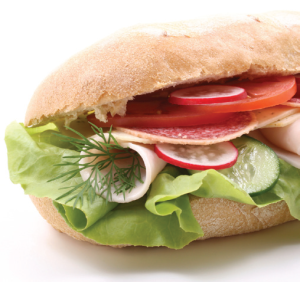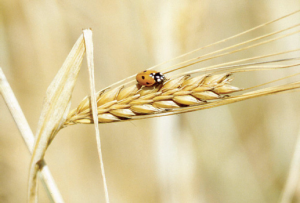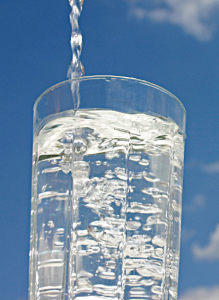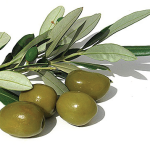
Prophet Muhammad said while interlacing the fingers of his two hands:
“Believers are like a structure, they support each other.”
Narrated by Al-Bukhari (481) and Muslim (2585)
Muhammad drew three lines on the sand and said: :

This is the human being (who has many hopes and plans in this worldly life). While he lives to attain or accomplish these hopes, death comes to him.”
Narrated by Al-Bukhari (6417) and Muslim (1671)
Muhammad’s sayings and teachings are highly influential as they cover most aspects of life: spirituality, morals, social matters, commerce, and more. His sayings emanate from a base of wisdom and divine revelation.
Muhammad’s sayings, actions, and attributes are known as sunnah and are embodied in collections of sayings, or hadith. The sunnah represents the second source of Islamic legislation after the Quran.
” Your companion [Muhammad] has not strayed from the path of truth nor has he been deluded. Nor does he speak out of whim.”
Quran, 53:2-3
Here is a selection of his sayings in relation to various life matters.
“Avail five before five: Your youth before senility (old age), Fitness before sickness, Wealth before poverty (needy), Free time before busy time, Life before death.”
Narrated by Al-Hakim in Al- Mustadriq No. 7846(4/341)

“The perfect believers are those who have the best manners.”
(Narrated by Tirmithi)

“Two graces, many people underestimate; health and free (leisure) time.”
(Bukhaari, 6049)

“Envy is forbidden except in two cases ( your wish to have the same thing others have but no bad wishes to them). The first one is a man on whom God bestowed wealth and he spends it righteously. The second case is a man on whom God bestowed wisdom and he acts according to it and teaches it to others.”
(Bukhari, 73/15)

“Make things easy to people (concerning religious matters), and do not make it hard for them; give them good tidings and do not make them run away.”
(Bukhari, 69/11)

“Those who do honest trading and business based on clear terms, God blesses them and their business (trade). On the contrary, God does not bless those who lie and hide facts.”
(Bukhari, 2082/22)

“You will not be a believer in God unless you like for your brethren what you like for yourself.”
(Bukhari, 13/7)

“Every Muslim should pay Sadaqa (spend something for charity); if he didn’t find what to spend then let him work in order to benefit himself and be able to pay charity; if he didn’t find a job, then let him help others (this is an act of charity); If he didn’t find anyone to help, let him do good deeds and refrain from (avoid) doing bad or evil deeds. This is a charity for him.”
(Bukhari, 1445/30)

“When a man dies, he gains no rewards except from three things; in case he had dedicated a charity that people can continuously profit from, or he had left knowledge or a science that benefits the humanity, or if he had left a good (faithful) son who keeps on praying and asking God’s blessings and forgiveness for his parents.” (This is applicable to both males and females)
(Narrated by Muslim, Tirmithi, Nassa’i)

“Be mindful of Allah wherever you are, follow a bad deed with a good deed as it erases it, and deal with people with high ethics.”
(Tirmithi, 1987 and Ahmad 5/153)

“Righteousness is in good character, and wrongdoing is that which wavers in your soul. You hide in your heart and dislike people finding out about it.”
(Muslim, 15/2553)

“A strong person is not the one who throws his adversaries to the ground. A strong person is he who contains himself when he is angry.”
(Bukhari, 5785) and (Muslim, 4853)

“Whoever believes in Allah and the Day of Judgment should say good (words) or keep silent and whoever believes in Allah and the Day of Judgment must honor (be generous with) his neighbor and whoever believes in Allah and the Day of Judgment must honor (be generous with) his guest.”
(Bukhari, 6018 & Muslim 74-47)
Sayings of Prophet Muhammad in relation to food and medicine
Prevention is better than cure
Although Muhammad was not a physician, his sayings in relation to food, healthy eating habits, treatment with herbs were collected in books later known as “The Prophetic Medicine”.
Muhammad indicated on several occasions that the belly is the worst pot to fill. Small meals and a few bites that satisfy hunger will be better than filling the stomach. They help a great deal avoid health complications.
He encouraged his companions to eat and drink in moderation, avoid obesity and maintain an active and healthy lifestyle. He recited God’s Words in this context. Verse 31, Chapter 7 in the Quran states:
“O Children of Adam! Wear your beautiful apparel at every time and place of prayer: eat and drink: but do not be prodigal (waste by excess). He (God) does not like prodigals (extravagant people).”

Muhammad prescribing barley

Today, there is a great deal of research that demonstrates the amazing health benefits of barley. Barley grass is a whole food supplement.
It contains a wide spectrum of enzymes, vitamins, minerals, phytochemicals and all eight essential amino acids including tryptophan, which helps prevent depression.
Muhammad recommended barley soup (talbinah) for stomach disorders and indicated in his undisputable sayings that it helps relieve sorrow and depression. His wife Aisha used to recommend the close relatives of a deceased person to have talbinah soup in order to relieve sorrow. (Bukhaari, 5365) and (Muslim 2316)
According to medical research, depressive illness is found to be caused by a decrease of certain chemicals or neurotransmitters in the brain that are responsible for mood. Antidepressants stimulate chemical changes that increase the levels of these neuro-transmitters.
The three main neuro-transmitters associated with mood are serotonin, norepinephrine and dopamine. Barley was found to influence serotonin in a positive way that relieves depression. The prescription of barley by Muhammad 1400 years ago was definitely incredible.
Muhammad avoided eating wheat and instead mostly ate barley and bread made from barley flour.
It has been discovered that whole grain barley has many health benefits. It can regulate blood sugar, prevent tiny blood clots, and reduce the body’s production of cholesterol.
It is part of Muhammad's teachings to have small meals during the day. The belly must not be more than two thirds full. He told his companions to keep one third of their stomach's space for food and one third for drink and the last third should be kept empty for breath. (Source: Miqdam Bin Ma'di Yakrib) Riyadh Saliheen, (516)
Zamzam mineral water

Zamzam is the name of mineral water that comes out of a well 20 meters east of Kaabah in the Sacred Mosque in the city of Makkah. Muslims believe that it was miraculously generated thousands of years ago when Ibrahim’s son Ishmael was thirsty and kept crying and kicking the ground until water gushed out (after his mother Hagar spent a lot of time looking for water).
Zamzam water is slightly alkaline (pH=7.5) and has a distinct taste. (Please note that drinking de-mineralized water such as distilled waters will create an acid pH in the stomach and intestines. Also, it will aggravate acid reflux.)
Muhammad said that Zamzam water is a blessed water from God. It is a lavish meal and a healer from many diseases (Narrated by Bazzar and Tabarani).
Mineral water is classified by the U.S. Food and Drug Authority as having at least 250 parts per million (ppm) (total dissolved solids TDS).
Chemical analysis of Zamzam water revealed that it has an average of 1000 ppm of mg/L, TDS. However, it complies with World Health Organization standards for potable water.
It is a plentiful meal that contains a range of minerals that the human body needs such as calcium, (which is needed for strong bones and for the heart, muscles and nerves to function properly), fluoride, which is necessary for teeth and bicarbonates, which helps food digestion.
Zamzam water is one of the richest potable waters with calcium. It has 195-200 mg/L calcium (this is about 20% of the average recommended daily intake of calcium for adults). It is higher than many known mineral waters on the earth such as “Evian” (78-80 mg/L calcium) and “Perrier” (147-150 mg/L calcium).
Mineral water has a wide range of therapeutic functions that can relieve and treat muscle and joint inflammation, rheumatism and arthritis.

Truffle as a medicine

Muhammad said: “Truffles are a kind of ‘Manna’ (sent down upon the children of Israel) and their juice is a medicine for the eyes.”
Narrated by (Bukhari, 5708) and (Muslim, 5244)
Truffle is a fleshy fungus mushroom-like plant that belongs to the Agaricaceae family. It grows in groups under the surface of the soil (2-50 cm deep) in desert moist areas without leaves or roots. It has a distinct smell and can be white, gray or brown in color.
According to the analytical research, 77% of the truffle is water and the remaining part is a mix of protein, fat, carbohydrates and other materials.

However, modern science discoveries indicate that the liquid of truffles has an effective curable effect on many eye diseases including trachoma, which is an infectious eye disease that causes damage to the cornea cells.
Muhammad and olive oil

Muhammad described olive oil as coming from a blessed tree. He recommended his companions to eat olive oil and to anoint or smear it over their body skin.
(Narrated by Tirmithi,1851)
Modern science confirm that olive oil is full of health benefits. There are plenty of mono unsaturated fatty acids in olive oil which increase the amount of good cholesterol and decrease the amount of bad cholesterol. Olive oil reduces cholesterol and it has positive influence against heart diseases.

Olive oil is very well tolerated by the stomach. It is believed that olive oil has protective influence against ulcers and gastritis.
Extra virgin olive oil, from the first pressing of the olives, contains higher levels of antioxidants, particularly vitamin E and phenols, because it is less processed.
Today, olive oil is considered a good remedy for skin problems and an effective moisturizer.
Those at risk of diabetes are advised to combine a low-fat, high-carbohydrate diet with olive oil. Studies show this combination is superior at controlling blood sugar levels compared to a diet that consists entirely of low-fat meals.
Allah is the Light of the heavens and the earth; the example of His light is like a niche in which is a lamp; the lamp is enclosed in a glass; the glass is as if it were a star shining like a pearl, kindled by the blessed olive tree; neither of the east nor of the west; whose oil would almost glow (get ablaze) by itself although the fire does not touch it; light upon light; Allah guides towards His light whomever He wills; and Allah illustrates examples for mankind; and Allah is Knower of everything.
Quran, 24:35